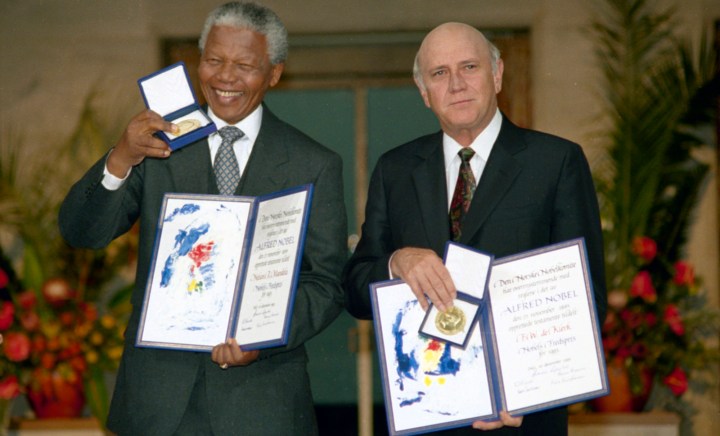AFTER THE BELL
Banks, the Nobel Prize, and our vulnerability to the fear of fear itself

When prizes are given, it’s easy to miss their significance. They happen so regularly, the clocklike monotony and the recurring debates about who was left out and who should have got one tend to obscure the moment itself.
One of the greatest moments of my life was being present in Oslo, Norway, in 1993 when Nelson Mandela and FW de Klerk were awarded the Nobel Peace Prize. The moment was bathed in a kind of impossible wonder. It was also a little dull.
I wouldn’t want to minimise for a moment the significance of the event and the timing and the encouragement it gave both politicians to complete the job. The Nobel committee members really deserve a prize themselves for picking the South African politicians at just the right political instance when the negotiations process was so close to completion, and in so doing, they made an extraordinary contribution to peace themselves. It’s just that the ceremony itself was uninspiring, as these grand functions tend to be.
Both men gave speeches that everybody had heard many times before, a choir sang, medals were handed out, everybody clapped, and off we all went to drink tea. I’ve been to school assemblies that were more scintillating.
When prizes are given, it’s easy to miss their significance. They happen so regularly, the clocklike monotony and the recurring debates about who was left out and who should have got one tend to obscure the moment itself. For South Africa, the award of the Nobel Peace Prize implicitly asked each of the participants how they wanted to be remembered. The prize gave both politicians a perspective outside their narrow political stresses. They went home, settled the few but crucial outstanding issues in the negotiations, and within a few months, democratic elections took place. Hallelujah!
I was thinking back on that moment when I saw that former US Federal Reserve chairman Ben Bernanke was one of three economists who won this year’s Nobel Memorial Prize in Economic Sciences. It seems possible that the significance of Bernanke’s prize, and that of Douglas Diamond of the University of Chicago and Philip Dybvig of Washington University in St Louis, might also be somehow missed.
The trio got the prize for work they did on financial crises, and Bernanke’s own contribution was an analysis of how the Fed’s failure during the early 1930s to prevent a series of bank failures vastly accentuated the Great Depression.
This is full of irony. Bernanke, of course, was the Fed chairman during the 2008 financial crisis. He was party to a decision early in the crisis to allow Lehman Brothers to declare bankruptcy.
Visit Daily Maverick’s home page for more news, analysis and investigations
Writing in The New Yorker, John Cassidy records that when a full-blown financial crisis erupted: “Bernanke heeded the lesson of the thirties, and the messages of Diamond and Dybvig, going all out to prevent a wholesale collapse of the banking system. He encouraged Congress to bail out the biggest banks.”
The decision was then and is still today massively controversial. Nobody wanted to see these irresponsible greedy bankers continue to live the flagrant lifestyles to which they had become accustomed. In retrospect, the decision might have been unpalatable but was probably the right one.
Yet, the cataclysm of 2008 really changed the course of economic thinking. Cassidy adds: “Before the financial crisis, Wall Street lobbyists and free-market economists had claimed that banks could be left to their own devices, and that, if some of them did get into trouble, the regenerative powers of the free market would somehow prevent a broader economic calamity. Many macroeconomists, meanwhile, had become besotted with mathematical models of the economy that didn’t even include a proper financial sector.” Turns out they were wrong.
What I did not realise is how much the Swedish Nobel committee in Stockholm had supported this approach over the years. And that was rooted in Sweden’s own politics, and particularly the debate between social democracy and the business elites. The economics prize was introduced much later than the prizes for physics, chemistry, medicine and literature. It was overseen by Sweden’s central bank and tended to award prizes to free-market-leaning economists.
Hence, Friedrich Hayek, Ronald Coase, George Stigler and Milton Friedman were all honoured, but many noted left-leaning economists, including John Kenneth Galbraith, Joan Robinson and Hyman Minsky were overlooked, Cassidy points out. Not all economists were against economic intervention, including, as it happens, Friedman. But generally, they felt the economy should be left to its own devices.
This award demonstrates how far we have come from that philosophy. Cassidy calls it “a belated effort by the Stockholm committee to atone for its past sins”. I’m not sure I would go that far, but you get the idea.
There is a more important reason why the decision is apt today: in a time of rising interest rates, the vulnerability of banks comes into the frame again. And you can see that very clearly now in the UK, where the Bank of England has been struggling to contain the fallout in the gilt markets, which has triggered a liquidity crisis among pension funds.
In the press conference after the award, Diamond said the US banking system is healthier than it was in the run-up to the financial crisis of 2008. But, he added, even “a well-structured financial system is very vulnerable to the fear of fear itself”. And that is a very fitting injunction at this disquieting moment. DM/BM




















 Become an Insider
Become an Insider
Comments - Please login in order to comment.